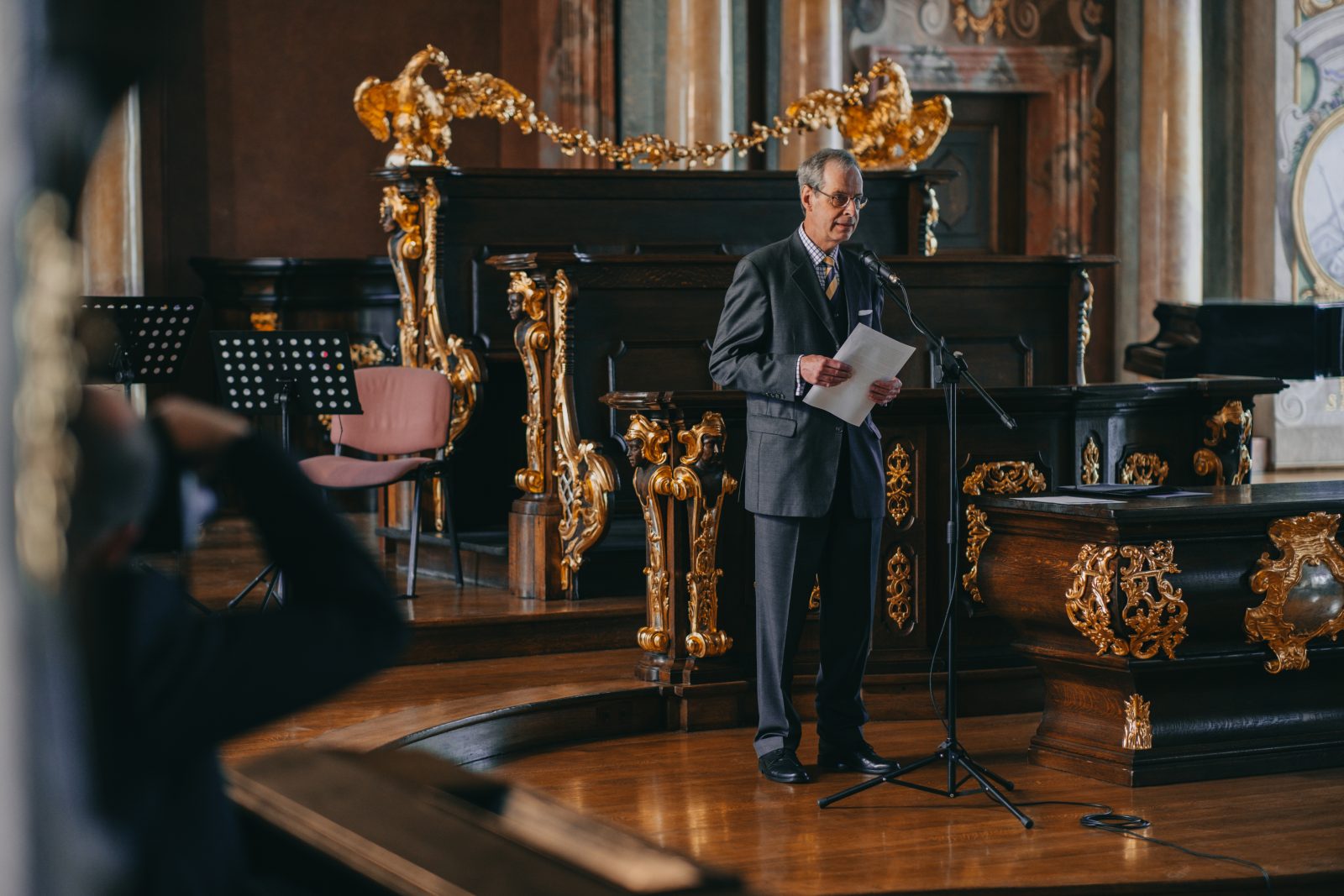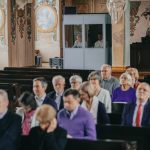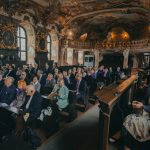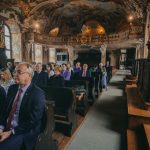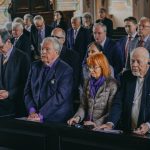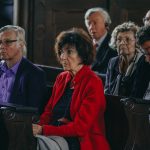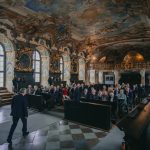
The German-Polish Society is recruiting!
Every year, around Pentecost, prominent experts from Germany visit the University of Wrocław. They represent half of the Society. The second half consists of Polish scientists. They have one thing in common: the desire to work for the University of Wrocław.
The reason for organising the event during Pentecost is quite simple. German Pfingsten is a public holiday. One day of vacation covers four intense days in Wrocław.
The German-Polish Society of the University of Wrocław was founded at the beginning of the 21st century by prof. Norbert Heisig. Heisig, now in his 90s, was born in Breslau. He had a staggering career as a doctor in Germany and once retired, devoted time and money to supporting his hometown. He was especially fond of the University of Wrocław. Thanks to his efforts, with the support of the entire Society, an unprecedented thing was achieved – the vault of Oratorium Marianum at UWr was painted. Allegedly, somewhere amongst the characters is also prof. Heisig himself. Where? He would not say.
He could not come to Wrocław this time because travelling would be too tiring for a ninety-year-old. There is a chance that he will visit in October, as two years ago, he founded the Heisig Prize – a Polish-German scientific prize awarded every two years from 2021. This year it will be awarded for the second time. Administered by the University of Wrocław, it is the highest financial prize for a Polish scientist. The laureate is selected from among Polish scientists by a jury appointed by Rector. Before that, the senates of universities participating in the “Excellence Initiative – Research University” Programme choose Polish scientists. The price honours scientists who conduct research at the highest level and whose discoveries change the world, i.e., stand out with innovation in an area significant for the modern world. Candidates may represent any field of science. The price is 200,000 PLN at the exclusive disposal of the winner.
During the meeting in Aula Leopoldina, Rector Robert Olkiewicz thanked the Society for its ongoing support for University of Wrocław. Prof. dr hab. R. Olkiewicz emphasised how grateful the University is for the commitment of the Society to building good relations between University and Germany. According to the rector, these meetings are always fruitful. Further, prof. Olkiewicz invited members of the Society to explore the city and University.
The chairman of the Society is the former consul general of Germany in Wrocław, dr Helmut Schoeps. Currently, he lives in Berlin, but for several years he was the head of the consulate in Podwale. During his speech, he sent greetings from prof. Heisig, his predecessor as a chairman.
“The Society has greatly suffered during the coronavirus pandemic. Not only because many of our members have been seriously ill and some have succumbed to the virus but also due to the three-year break when we could not meet in Wrocław. Luckily, we could meet last year and today in the renovated Aula Leopoldina.” said Schoeps.
Schoeps also thanked His Magnificence prof. Olkiewicz for the support extended to the Society, for participation in members’ meetings and for persuading Society members to visit Wrocław.
Today the Society has three hundred and fifty active members, the majority of whom are Poles and Germans. Nine members died this year, to whom tribute was paid with the minute of silence. Five new members joined the Society. Schoeps emphasised that the most significant task for Society is to search for new members, especially among young people. That is why he encourages current and former students of the University of Wrocław to join.
Among the five new members is journalist Joanna Mielewczyk from Radio RAM. During her auditions, she talks about the history of tenement houses in Wrocław, emphasising Polish-German aspects.
This year, two people received honorary membership of the Society. The first is dr Wolfgang Tierse, former President of the Bundestag. The second is the former rector of University of Wrocław – prof. Adam Jezierski.
Professor Jezierski was present during the meeting – as he said, it was an honour and pleasure for him, as the Society has been functioning and developing. Additionally, the Society’s journal Akademisches Kaleidoskop will soon be published. It will discuss the most significant achievements of the Society.
“I have shown your people around the University of Wrocław many times, and I always mention the Society because young people often ask me: why the war? Why is the world going in the wrong direction? Then I remind them that Wrocław is a palimpsest, a space of overlapping cultures. But we cannot move forward if we do not remember our past and ancestors. And that is the role of the Society!” said the former Rector Jezierski.
In between speeches, the meeting was accompanied by a string quintet conducted by Wiktor Kuznetsov.
The audience gathered in Aula Leopoldina also listened to a solemn lecture on the beginnings of medicine at the University of Wrocław by Dariusz Lewera from the Medical University.
As the speaker pointed out, the beginnings of academic medicine in Wrocław should be associated with 1811, when Leopoldina was merged with Viadrina, and the university became secular. The first lecturers were practising physicians. The first rector of the merged universities was the physician Karl Berenz. Medicine was taught by practising doctors who worked in the nearby hospital of Eleven Thousand Virgins [Jedenastu Tysięcy Dziewic] in Ołbin or the Holy Spirit [Ducha Świętego] at ul. Mikołaja. Hospitals were funded from the townspeople’s money and were very rich. Suffice it to say that when hospital mentees were getting married, they could count on a dowry from the institution.
Among important names of Wrocław medicine are Von Krafftheim – the author of the first epidemiology handbook, and Peter Monavius – the first doctorate in stomatology.
The most important name of the first stage of medical science in Wrocław was Purkyne, the founder of modern physiology.
As another doctor of that time, Struempel, assessed – there is no other scientific center in the world where there would be so many authorities in one place!
Another significant person from Wrocław is surgeon Mikulicz Radecki, who invented dozens of surgical instruments, some of which are still used today. He developed gastric endoscopy, having previously built a microscope. Moreover, he introduced sterility into the operating theatre and ordered hats, masks, and thread gloves to be worn.
The other curious name is Foerster, a pioneer of neurosurgery. In 1903 he habilitated in Aula Leopoldina. He treated epilepsy with surgery and was so well-known that he was summoned to Moscow to treat Lenin in 1922-1924 in Gorki. In Wrocław, he lived in Biskupin, which is now the rectorate of the Academy of Physical Education.
The next very important doctor for Wrocław medicine was Guttman, who treated spinal cord injuries. He deducted patients cannot be kept in plaster cocoons because, after a few weeks, kidney failure and death occur. Instead, he put them in wheelchairs. He consulted Salazar and went to London and Oxford. As well as organised the Paralympics for wheelchair patients. Today he is considered the founder of the Paralympic movement.
Another important name is Alois Alzheimer. He lived in Wrocław already as a medical star from the “disease of forgetting”, i.e., dementia coming at an early age.
Also working in Wrocław was prof. Jokl, the founder of sports medicine. In the post-war period, the Hirszfeld marriage was very well-known. And today, Wrocław medicine is represented by Prof. Dariusz Patkowski, a pediatric surgeon, and prof. Paweł Tabakow, the neurosurgeon who electrically stimulates obsessive-compulsive disorder.
The last part of the meeting was presenting the Leopoldina Prize, the Society’s award funded by the Heisig marriage. Every year one researcher from the University of Wrocław receives 20,000 PLN. A total of nine entries were submitted this year. Rafał Biskup’s doctorate on the German Silesian dialect emerged at the best. The researcher was recognised, among other things, for his thorough study of dialects from the 19th and mid-20th centuries.
Translated by Klaudia Kaczmarek (student of English Studies at the University of Wrocław) as part of the translation practice.
















